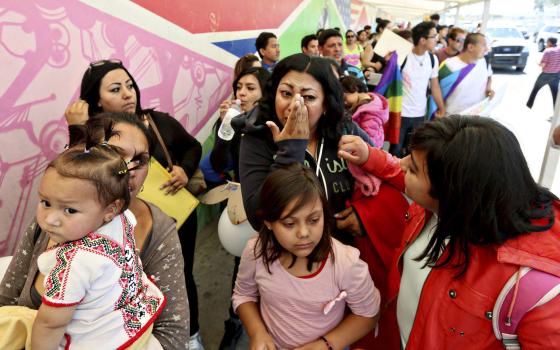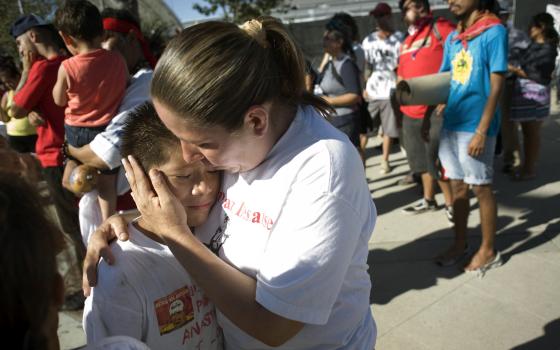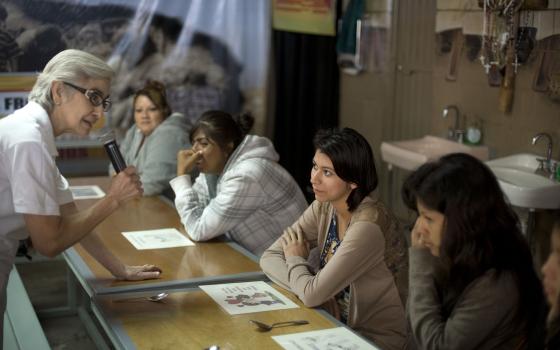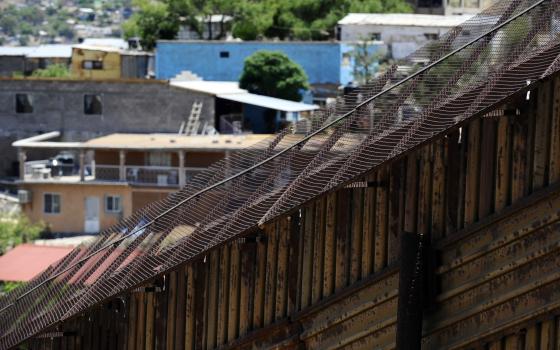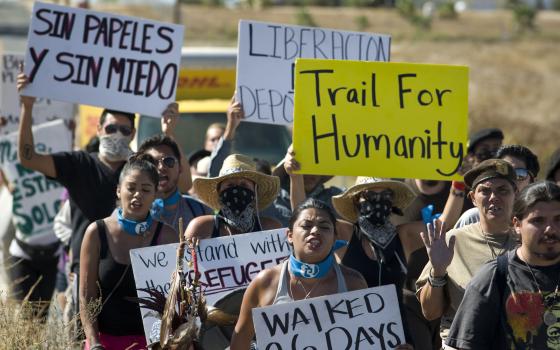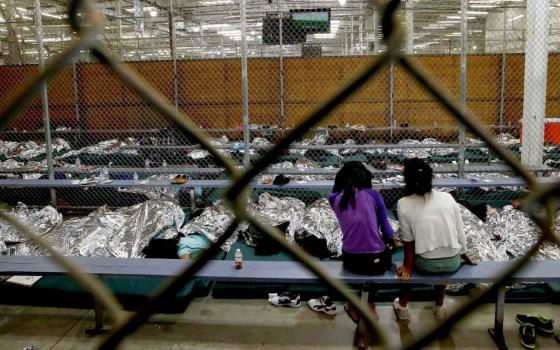Women and children fleeing horrific violence in Central America remain caught in the wheels of the American immigration system, advocates say, despite a court order that the government take their cases seriously.
“They feel besieged,” said Yvonne Dilling, a lay missioner with the Maryknoll Fathers and Brothers. Dilling visits people detained at the federal government’s family detention center in Karnes City, Texas. “Some are in and out in a month or so, others are just held there, and no one seems to be moving their case forward at all.”
More than 1,000 families remain in detention, mainly in Karnes and at Dilley, Texas, where advocates say they are traumatized and depressed as their cases languish in the immigration court system.
The number of families in detention has remained about the same, despite the government closing the detention center in Artesia, New Mexico. Dilley opened in December able to hold close to 500 people but will ultimately be able to house 2,400. Karnes is doubling in size to house 1,200. Both are run by private contractors.
Dilling said the detainees fleeing violence in their home countries of El Salvador, Guatemala and Honduras, come from areas where government has broken down and is unable to protect its citizens, only to be detained in the United States where they’re seeking asylum. The fact that they are in detention means they’ve already met with an asylum officer who has determined they have a “credible fear” of persecution back home – meaning their asylum case has merit – or they would have already been deported.
But here they sit, trying to raise children. Dilley is southwest of San Antonio; Karnes is southeast of the city – both in remote, isolated areas. While Karnes has grass and trees, Dilley is described by those who have been there as desolate, with a landscape of dirt and gravel.
On Friday, several bishops will tour the Dilley Detention Center and meet with families there. Among those touring are San Antonio Archbishop Gustavo Garcia-Siller; Eusebio Elizondo, auxiliary bishop of Seattle and chairman of the U.S. Conference of Catholic Bishops’ Committee on Migration; Bishop James A. Tamayo of Laredo, Texas; and two leaders from the Evangelical Lutheran Church in America, Bishop H. Julian Gordy and Bishop Michael Rinehart.
What the government calls family detention is much more like prison, advocates say.
“The laws are very complicated, the women don’t really understand them, and the access to translators is not always there for them,” Dilling said. “Frequently they come out and say to me, ‘I got all these documents and they’re in English. Can you tell me what they say?’”
Dilling said she knows the damage being done to families just by seeing how much her visits mean to them. Dilling is able to visit detainees only because her contact information is passed along and she is invited by detainees as a friend.
“That’s what the women express over and over again – that it means so much that someone besides their family members knows they’re there and cares that they’re there,” Dilling said. “I never before truly understood the power of Mathew 25:35 [“I was in prison and you visited me . . .”]. Human contact is just so valuable, and that’s what the women and children express over and over again.”
Dilling has been a lay missioner to Central America most of her adult life, with much of her time spent in El Salvador and Honduras where she developed a large network of friends. So when she got a phone call from a relative of a detained family asking if she could visit them, the decision was easy. Now people pass on her contact information and the visits have become part of her mission.
“Now I’ve just kind of stepped it up,” Dilling said. “I try to keep it in a pastoral role, but you also naturally become an advocate. I’m visiting them as a friend, but I live out my faith in everything I do, so it’s a pastoral visit, as well as a peace and justice mission.”
Even more galling to advocates is that the situation was supposed to have changed by now.
Ruling changed little
On Feb. 20, a federal judge ordered the government to stop wholesale detention of asylum-seekers as a way to deter other would-be immigrants. Instead, the court ruled, each case must be reviewed, and detention decisions must be based on whether the asylum seekers present a risk to public safety if released while awaiting their court date, The New York Times reported. Lawyers expected women and children would begin to be released within a week.
That hasn’t happened.
Instead, said Catholic Legal Immigration Network attorney Michelle Mendez, the government has set large bond amounts for families, putting release within their grasp, if only they could afford it.
Mendez recently spent two weeks working at the detention center in Dilley, Texas, where she said bond amounts she saw averaged between $7,500 and $15,000, though some were higher or lower.
“It makes it a very, very cost-prohibitive decision,” Mendez said. “The women can get those bond determinations reviewed by an immigration judge, but when I was there I didn’t see a ton of significant decreases of those amounts. By and large, the women were not able to pay.”
That leaves them in detention until their case is heard, which could be months if they have an attorney, or much longer if they do not.
CLINIC and other organizations are working together to ensure detainees not only get legal assistance while inside, but that the assistance continues after they are released. Those with attorneys are much more likely to be released, advocates say. Those without lawyers face trying to understand the legal process and getting documents to the court in another city – sometimes as far away as Denver, where an immigration judge hears cases via video-conference, in English. If they’re released, the struggles continue.
“They face misinformation from the community and people posing as immigration attorneys trying to take their money,” Mendez said. “But the statistics show that the women who have some type of legal assistance have a very, very high rate of showing up to court and completing the process.”
Women still in detention have a fear of government from back home, Mendez said, and they don’t know whom to trust. “They have these horrible stories, but they’re in detention and can’t get out and it’s clear the government isn’t really trying to help them.”
They also feel pressure, she said, to simply go back home.
“When I was down there, some of the things were heard were that women were told, ‘Your bond is this. If the judge doesn’t lower it, you’ll have to spend eight months in here fighting it, so you might as well just sign your deportation papers and save yourself and your children eight months in detention,’” Mendez said. “Those were rumors we couldn’t confirm, but clearly the government’s emphasis is on deportation, not granting asylum.”
Of course, everything is easier – and faster – if you have an attorney. For months CLINIC has been one of the groups coordinating the efforts of volunteer attorneys and providing technical support, training and supplies. Under a partnership with other agencies, CLINIC will soon have a full-time attorney at Dilley, plus support from Mendez in Washington, D.C., as well as the volunteers who come in for a week at a time.
How great is the need for attorneys? Law students are spending their spring breaks volunteering, and they are warmly welcomed.
“The need is that great that we’re even taking law students,” Mendez said.
But with much of the focus on detention in recent months, another, broader, need has quietly slipped from the headlines.
Thousands more need help
While immigration officials are indeed detaining asylum-seekers at the border and it is indeed difficult to leave detention, not all asylum-seekers are detained. In fact, officials say, only a fraction of them are detained as part of the government’s efforts to send a message to others not to try coming to the U.S. The majority of those apprehended are given a date to appear and are released on their own recognizance. When their court date comes up, they can then argue their case for asylum.
Missionaries of Jesus Sr. Norma Pimentel, executive director of Catholic Charities of the Rio Grande Valley, helps those released in Brownsville, Texas.
Pimentel said the immigrants are released at a bus station, where officials from Catholic Charities or one of its many partners are waiting for them.
“They’re on their own without any help at all. They’re abandoned in the streets,” Pimentel said. “The clothing they have is soiled and dirty. But we have a respite center where they can shower and clean up. It’s a whole operation we have set up through donations and volunteers.”
Once their immediate needs are provided for, the immigrants are sent to the homes of friends, relatives or those willing to take them in, settling them across the country.
Pimentel said the work began June 9 when she got a call from a local priest in the Brownsville, Texas, diocese, saying parishioners were at the bus station trying to help, but were overwhelmed.
“He said, ‘You need to help us.’ We had no clue what was ahead of us,” Pimentel said. “That first night we helped 200 people.”
At times there were 300 people a day, she said. And though the volume has slowed, there are still 30 to 60 people every day who need help. Since June 9, she said, they have helped over 18,000 people.
Pimentel said her agency was already helping immigrants, but the numbers were small.
“We had no idea what we embarking on,” she said.
She also had no idea of how people from all over the country, from every faith and denomination, would pitch in to help.
“The response has been overwhelming. We have volunteers from everywhere,” Pimentel said. “We have everyone by our side.”
She said the volunteers have ranged from Catholic sisters to Jewish rabbis to evangelical Christians.
“It’s very, very rewarding to see how we’ve come together,” Pimentel said. “The want us to tell them the needs and how they can help – we’re all united in the same response.”
She said that aspect has been a source of hope amid the tragedy of thousands of people having to leave everything behind to flee violence.
“It’s such a great example, it’s really beautiful,” Pimentel said. “It’s a sad story, and yet at the same time to see that response just lifts me up every day.”
[Dan Stockman is national correspondent for Global Sisters Report. Follow him on Twitter @DanStockman or on Facebook.]
Related - Faith leaders call for end to 'harsh policy' of detaining immigrant families on NCRonline.org
Detention at Christmastime: Immigration update by Dan Stockman
Border Mass reveals our distance by Janet Gildea
Immigration plight is ongoing by Jan Cebula
